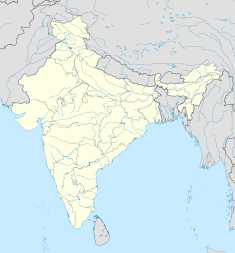Kodumanal is a village located in the Erode district in the southern Indian state of Tamil Nadu. It was once a flourishing ancient trade city known as Kodumanam, as inscribed in Patittrupathu of Sangam Literature.[1] The place is an important archaeological site, under the control of State Archaeological Department of Tamil Nadu. It is located on the northern banks of Noyyal River, a tributary of the Cauvery.[2]
| Kodumanal | |
|---|---|
| Location | Erode, Tamil Nadu, India |
| Coordinates | 11°00′45″N 78°09′36″E / 11.0125°N 78.16°E |
The ancient city edit
The inhabitants of this destroyed ancient city of Chera dynasty were highly skilled craftsmen, who were specialized in making beads and high-quality iron. The place is referred to in Sangam literature as an important industrial centre that had links with the Chola port city of Kaveripoompattinam, now called Poompuhar.[citation needed]
Roman trade route edit
The city played a major role in Indo-Roman trade and relations, as the ancient city is located on the mid-way of a Roman trade route, linking Muziris port on the Malabar Coast with the Kaveripoompattinam (Puhar) Port in the Coromandel Coast.[3][4][5]
Iron and metal edit
The iron and steel furnaces and iron artefacts produced in these places revealed the technical advancement made by the iron smelters around 500 BC. The excavated sword bit contained spheroidal graphite phase and forge welding of high-carbon cutting edge.[6][7] This place was once celebrated for its trade in precious stones like garnet, carnelian, lapis lazuli, sapphire and quartz. The people of this city were experts in manufacturing the finest iron.[citation needed]
Collections edit
Excavations uncovered ancient iron objects such as arrow heads and swords.[8] They also produced Roman artefacts, iron melting furnaces, beads, shell bangles and pottery with the Tamizhi scripts (from the habitation deposits and burials). Other artifacts uncovered during the excavation of this site include roulette pottery, Roman silver coins, and gold and silver spirals. A bronze statue of a lion and the iron melting furnaces were important to deciphering the site's history.[9][10][11][12][13]
References edit
- ^ "Stone spell". The Hindu. India. 19 March 2005. Archived from the original on 28 June 2006.
- ^ "Kodumanal likely to get a new lease of life with excavation". The Hindu. Erode, Tamil Nadu, India. 4 April 2007. Archived from the original on 11 April 2008.
- ^ The Hindu - Mar 2011
- ^ "Following the Roman trail". The Hindu. India. 17 August 2003. Archived from the original on 3 January 2004.
- ^ "'More studies needed at Pattanam'". The Hindu. Chennai, India. 24 May 2013.
- ^ "Indian Journal of History & Science,37.1,2002,17-29 (through "Digital Library of India")" (PDF). Archived from the original (PDF) on 25 April 2012. Retrieved 24 October 2011.
- ^ Indian Journal of History & Science,34(4),1999 (through "Digital Library of India") Archived 2015-09-23 at the Wayback Machine
- ^ "Excavations at Kodumanal village unearth more ancient objects". The Hindu. 10 May 2018. ISSN 0971-751X. Retrieved 24 June 2019.
- ^ "A great past in bright colours". Frontline. India. 8 October 2010. Archived from the original on 3 February 2011.
- ^ http://www.flonnet.com/stories/20120810291506200.htm[permanent dead link]
- ^ "BIG discovery: A 2,500-year-old industrial estate!". Rediff. Retrieved 24 June 2019.
- ^ Subramanian, T. S. (28 May 2012). "Kodumanal excavation yields a bonanza again". The Hindu. Chennai, India.
- ^ "KODUMANAL ERODE EXCAVATION". www.tnarch.gov.in. Retrieved 7 May 2016.
External links edit
- Singh, U. (2008). A History of Ancient and Early Medieval India: From the Stone Age to the 12th Century. Always learning. Pearson Education. ISBN 978-81-317-1120-0. Retrieved 19 February 2021.
- Francis, P. (2002). Asia's Maritime Bead Trade: 300 B.C. to the Present. University of Hawai'i Press. ISBN 978-0-8248-2332-0. Retrieved 19 February 2021.
- http://kodumanal.blogspot.com/2008/07/genesis-of-ukku-insights-from.html
- http://kodumanal.blogspot.com/2008/07/anchor.html
- https://web.archive.org/web/20060321084351/http://www.thebeadsite.com/UNI-MAPS.html
- http://www.krepublishers.com/02-Journals/T-Anth/Anth-06-0-000-000-2004-Web/Anth-06-2-091-157-2004-Abst-PDF/Anth-06-2-105-112-2004-Reddy-V-R/Anth-06-2-105-112-2004-Reddy-V-R.pdf
- https://web.archive.org/web/20110721154746/http://www.new.dli.ernet.in/rawdataupload/upload/insa/INSA_1/2000c951-385.pdf
- http://www.thehindu.com/arts/history-and-culture/article3465932.ece
